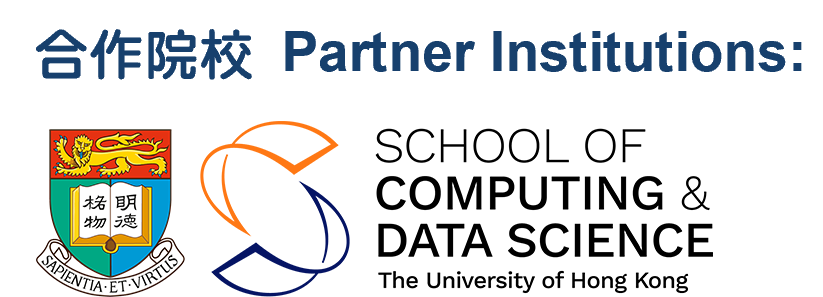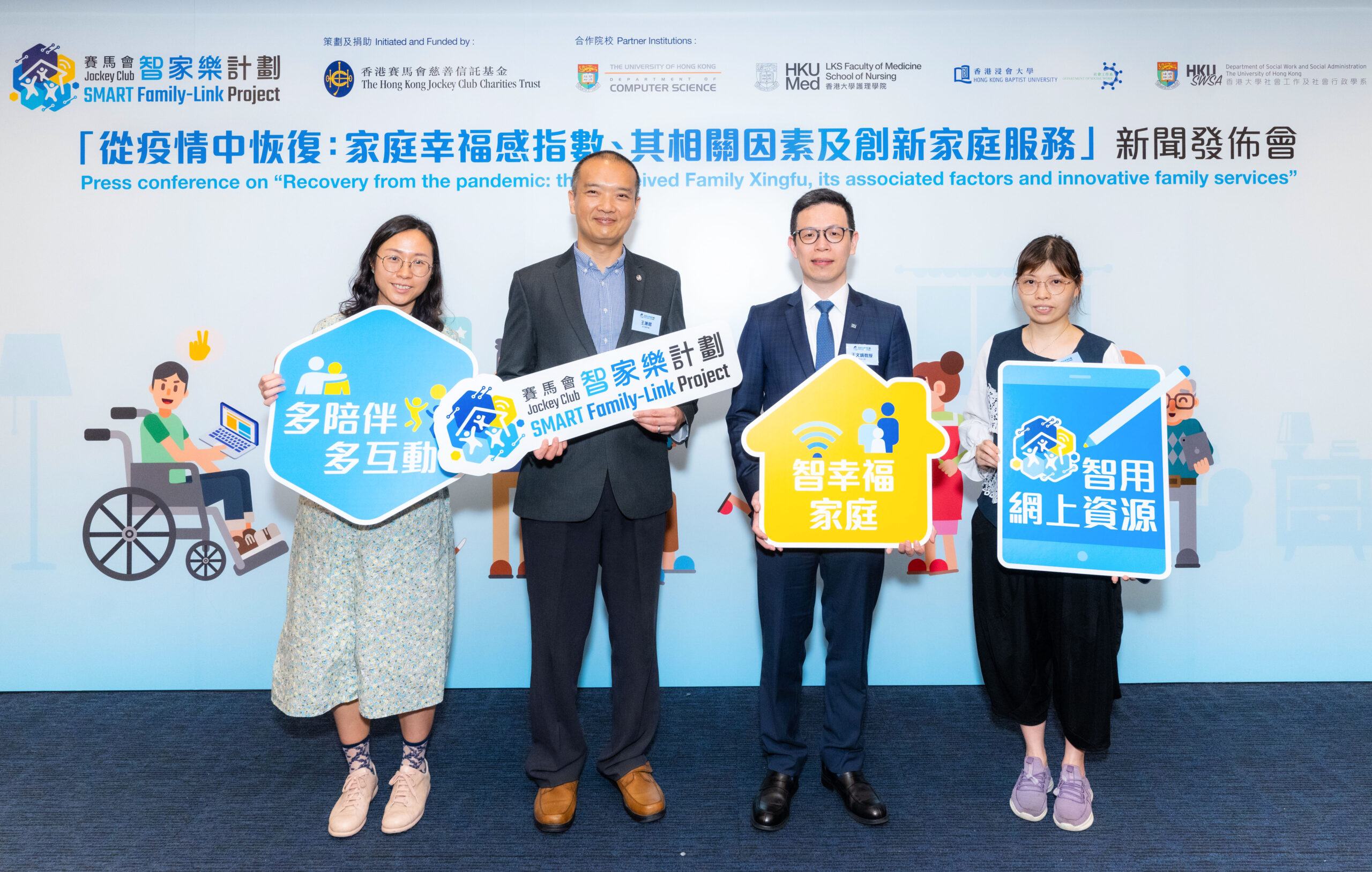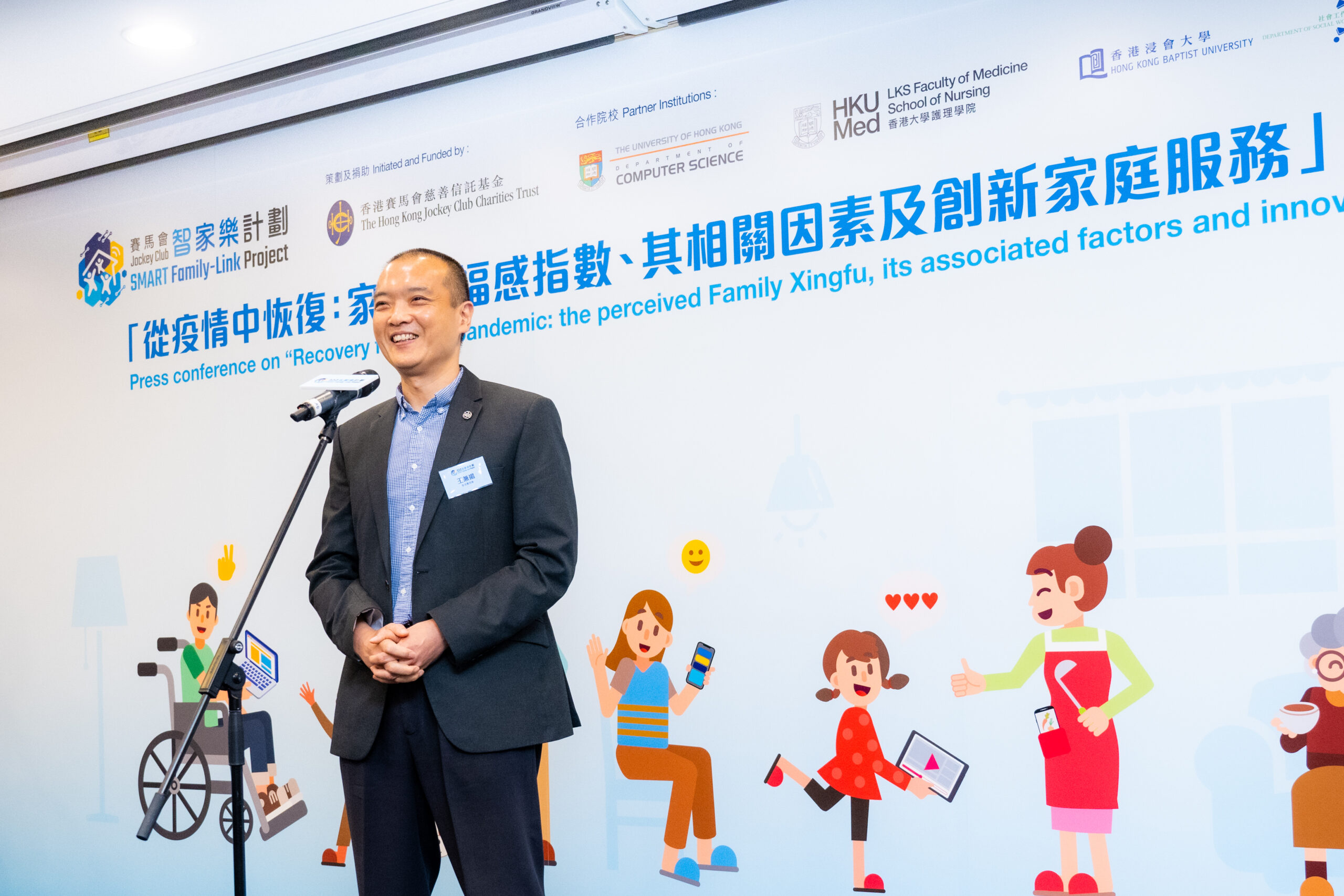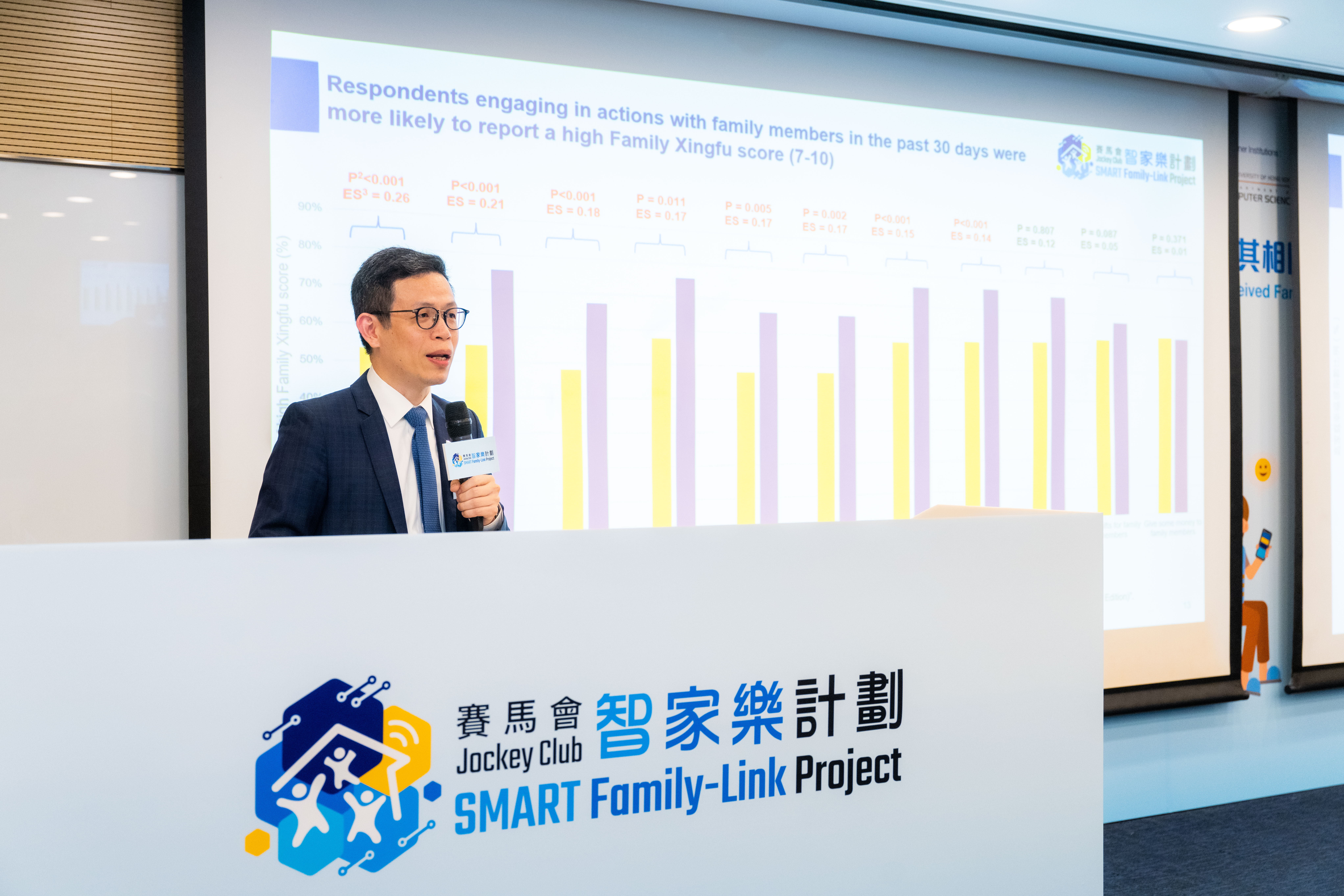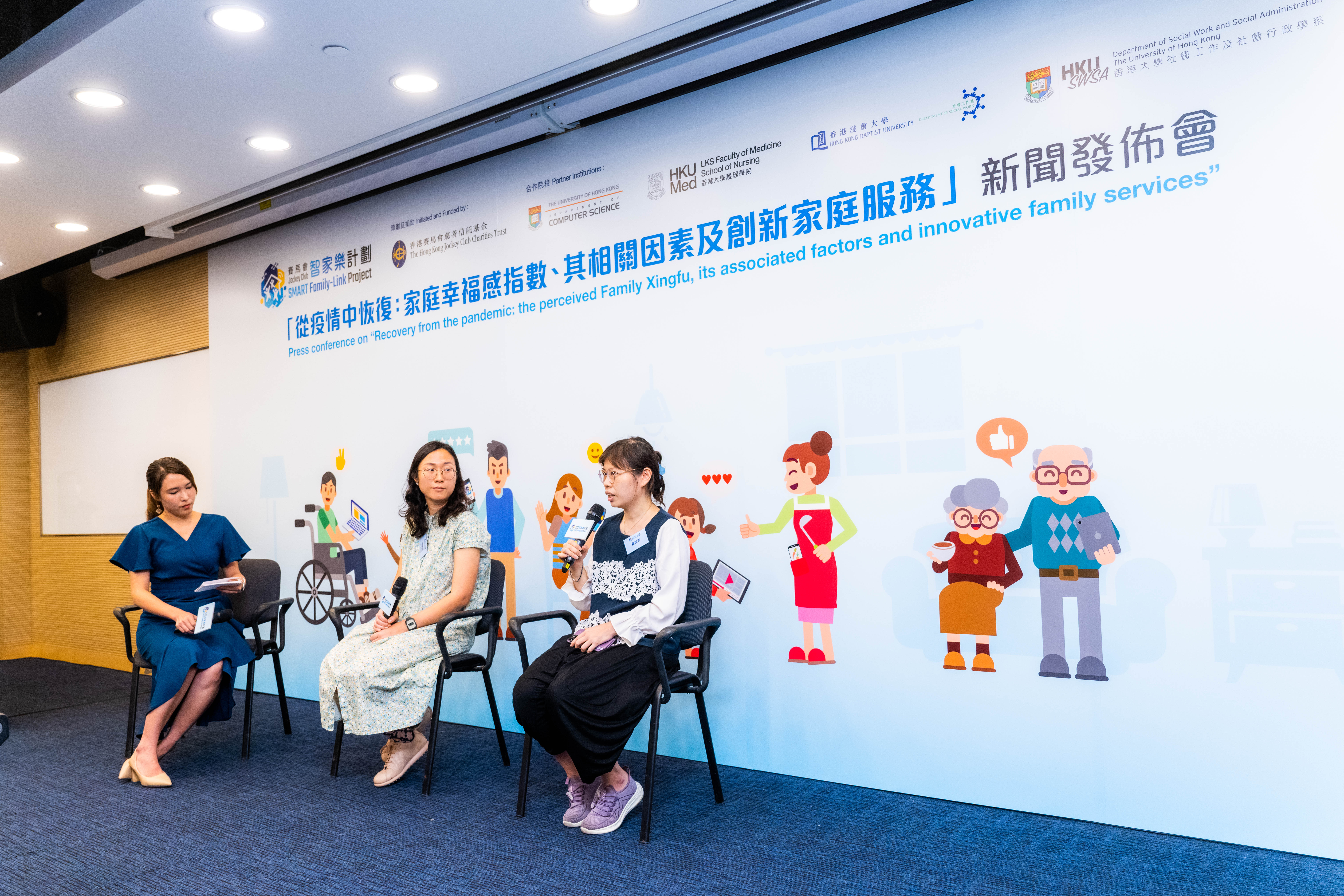
Media Events
Press Conference on the result announcement of the ‘Recovery from the pandemic: the perceived Family Xingfu, its associated factors and innovative family services’ (13th June 2024)
Nearly Sixty Percent of Respondents Reported a High Family Xingfu Score
Improve Family Communication, Express Affection and Prioritise Quality Time
For Greater Family Health, Happiness and Harmony
[13 June 2024, Hong Kong] There have been many changes in people’s lifestyles, including the ways families interact, since the pandemic. To better understand Hongkongers’ views on Family Xingfu post-pandemic, and to explore how innovative family service models can respond to the ever-changing needs of families to promote positive and proactive family life, the Jockey Club SMART Family-Link Project (“the Project”) team from the School of Nursing, Li Ka Shing Faculty of Medicine, The University of Hong Kong (“HKU”), conducted a survey and has published its findings in “Recovery from the pandemic: the perceived Family Xingfu, its associated factors and innovative family services”. (Xingfu partly representing Mandarin of well-being and feelings of happiness) The survey results were announced at a press conference today.
The Hong Kong Public Opinion Research Institute was commissioned to conduct the online survey between 6 July and 26 August 2023, and interviewed over 4,500 Hong Kong residents aged 18 or above. Nearly sixty percent of respondents reported a high Family Xingfu score. Those who often had fun with family, praised family members, or accompanied family members were more likely to report a high Family Xingfu score. Furthermore, respondents expressed a greater inclination towards participating in online activities organised by NGOs to improve family relationships.
Initiated and funded by The Hong Kong Jockey Club Charities Trust, the Project aims to leverage advanced Information and Communication Technologies (“ICTs”) to support more effective and innovative service delivery provided by NGO-operated Integrated Family Service Centres (“IFSCs”) and Integrated Services Centres (“ISCs”). It also aims to enhance the sector’s capacity to use technology and data for family service innovations that can respond to emerging service needs to promote family well-being.
Mr Bryan Wong, Head of Charities (Positive Ageing & Elderly Care) of The Hong Kong Jockey Club, said, “Families are the cornerstones of society. We hope that through the Jockey Club SMART Family-Link Project, the professional knowledge and strength of the welfare sector and academia can be combined to support IFSCs and ISCs in providing innovative family services with ICT to enhance family well-being. The public has increasingly relied on digital platforms for communication after the pandemic, emphasising the vital role technology plays in improving family relationships.”
The findings are summarised as follows: (for detailed survey findings, please refer to the appendix【Download Link】):
Nearly sixty percent of respondents rated their Family Xingfu score as high
- 58.0% of respondents reported a high Family Xingfu score (7-10).
Family Xingfu is influenced by factors such as gender, age, education level, family monthly income and property ownership
- Females (60.4%) and older people (55 or above: 64.2%) were more likely to report a high Family Xingfu score.
- Respondents with tertiary education (63.0%), family monthly income of HK$60,000 or above (73.7%) and those owning property (63.2%) were more likely to report a high Family Xingfu score.
Interactions and caring among family members are more effective in enhancing Family Xingfu than offering gifts and money to family members
- Respondents who often had fun with family (79.8%), praised their family members (75.7%), or accompanied their family members (67.3%) were more likely to report a high Family Xingfu score. Furthermore, the more actions respondents engaged in with family, the more likely they were to report a high Family Xingfu score.
- Respondents with better family communication quality (86.1%), more face-to-face communication with family members (73.1%) and those who were less lonely (74.4%) were more likely to report a high Family Xingfu score.
Respondents prefer using online family services
- Compared to face-to-face family services (30.9%), respondents were more willing to participate in online activities organised by IFSCs/ISCs (40.0%) to enhance family relationships.
- The top three reasons for preferring online participation included flexible service hours (64.3%), professional assistance provided by experts (51.3%) and the services being free of charge (46.5%).
In addition, the Jockey Club SMART Family-Link Project interviewed 51 individuals from 28 October to 5 November 2023 to understand their views on Xingfu. Respondents generally agreed that:
- Xingfu comes from the companionship and care of family members.
- Xingfu is a happy, harmonious and healthy family.
- Xingfu is having more communication, conversations and meals with family members.
Professor Kelvin Wang, the Project’s Principal Investigator; Assistant Dean (Professional Development in Health Sciences), Li Ka Shing Faculty of Medicine, and Professor, School of Nursing, HKU, said, “By understanding Family Xingfu and identifying the key elements that constitute it, we can more effectively support the public in building healthier, happier and more harmonious family lives. The survey shows that respondents hope to use ICT to enhance Family Xingfu. We will continue to collaborate with IFSCs/ISCs to organise public activities, enhance family services and strengthen family functions to improve family relationships.”
Professor Kelvin Wang shared some suggestions to promote Family Xingfu based on the survey results:
- Increase the quality and frequency of communication with family members.
- Endeavour to have fun with, praise and accompany family members. The more such actions the better.
- Employ information technology to strengthen family ties by leveraging online family services.
Ms Yiu, a front-line social worker from the International Social Service – Hong Kong Branch (“ISSHK”), a partner of the Jockey Club SMART Family-Link Project, pointed out that organising activities via online platforms facilitates the participation of individuals who are unable to personally visit the IFSCs, thus benefiting more families in need. The integration of information technology elements into innovative family services also attracts more service users. Ms Lo, one of the service users, said that the group activity organised by ISSHK, focusing on emotions and with both online and offline components, helps parents manage their parent-child relationships. It also allows her to establish a common language with her children in a familiar environment, enabling the children to communicate more proactively.
– END –
Copyright © Jockey Club SMART Family-Link Project. All Rights Reserved. 版權所有


